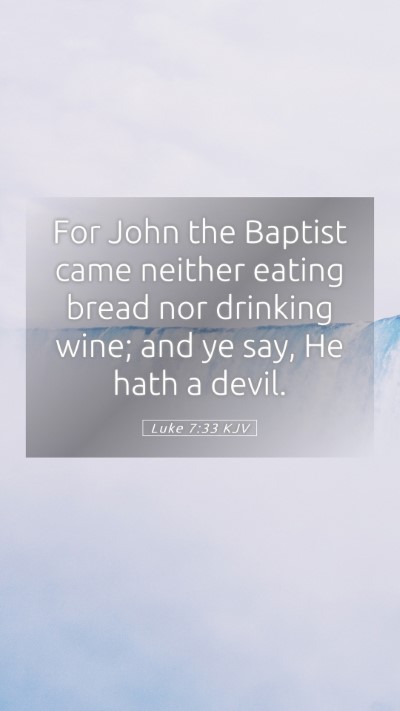Bible Verse Meaning and Interpretation for Luke 7:33
In Luke 7:33, Jesus addresses the misunderstandings surrounding His and John the Baptist's ministries. This verse sheds light on how both figures were perceived by the people of their time. Here, we provide a comprehensive analysis combining insights from public domain commentaries to deepen our bible verse understanding and bible verse interpretations.
Verse Context
Luke 7:33 states, "For John the Baptist came neither eating bread nor drinking wine; and ye say, He hath a devil." This verse is part of a larger discourse where Jesus compares the reactions to His and John’s ministries, highlighting the spiritual blindness of the people.
Historical Context
This verse reflects a significant feature of the time: the expectation of the Messiah and the erratic responses to prophetic figures. John the Baptist lived a life of asceticism, while Jesus dined with sinners and welcomed the marginalized.
Commentary Insights
Matthew Henry’s Commentary
According to Matthew Henry, this verse indicates the inconsistency of the people’s judgments. They criticize John for his ascetic lifestyle, suggesting he was possessed, yet when Jesus, the Son of Man, came embracing fellowship and feasting, they labeled Him as a glutton and drunkard. Henry emphasizes the hypocrisy in their assessments, reflecting human tendencies to judge God’s messengers based on personal biases rather than divine truths.
Albert Barnes’ Notes
Albert Barnes highlights that these contrasting responses reveal the hardness of heart among the people. They were unwilling to recognize the truth displayed through both John’s austere lifestyle and Jesus’ inclusive ministry. Barnes underlines that this verse is a striking indication of how people often misinterpret the works of God, demonstrating a broader teaching about openness to divine action in various forms.
Adam Clarke’s Commentary
Adam Clarke points out the mocking tone of the crowd's remarks about John. The statement about John having a devil speaks to the pervasive skepticism of the culture towards the prophetic messages. Clarke asserts that Jesus' defense illustrates the need for spiritual discernment, as the genuine work of the Holy Spirit often goes unrecognized by those trapped in their prejudices.
Application and Significance
This verse invites us to consider how we view the actions and lifestyles of others, especially within the context of Christian ministry. It challenges individuals to reflect on their biases in Bible study groups and the larger community, urging introspection about how we label and judge others based on their adherence to societal norms versus divine calling.
Personal Reflection
As believers, it is essential to acknowledge that God may work through diverse means. In applying the meaning of Bible verses like Luke 7:33, we ought to cultivate hearts that are open to recognizing God's influence, regardless of how unconventional it may appear.
Cross References
- Matthew 11:18-19 – Similar critique regarding perceptions of Jesus and John the Baptist.
- John 10:20 – Reference to Jesus being called demon-possessed.
- Luke 5:29-32 – Jesus feasting with sinners as a point of criticism.
- Luke 1:15 – John the Baptist’s character and role foretold.
- 1 Corinthians 1:27 – God’s choice of the foolish things of the world.
Further Study and Resources
For those looking to delve deeper into Bible verse commentary and analysis, consider utilizing bible study tools and bible study resources that focus on understanding difficult Bible passages. Online platforms and bible study guides offer a multitude of lessons and insights for reflection.
Recommended Topics
- How to interpret Bible verses
- Understanding difficult Bible passages
- In-depth Bible verse analysis
- Historical context of Bible verses
- Applying Bible verses to daily life
In summary, Luke 7:33 serves as a profound reminder of the complexities in understanding God’s messengers and their missions. Emphasis on openness and avoidance of hypocrisy is paramount for genuine spiritual growth and understanding.


